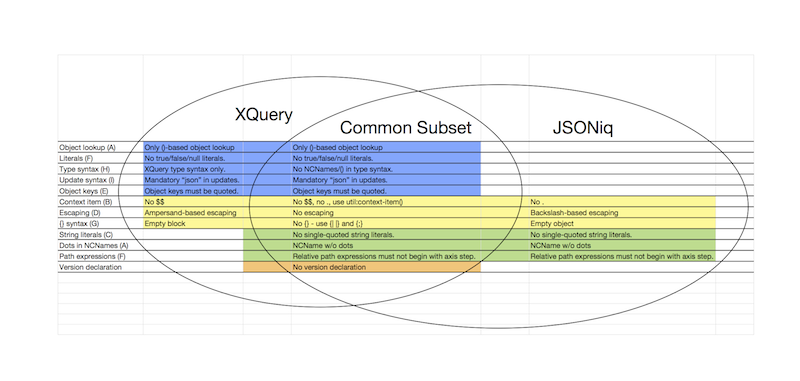View as source file or XML.
XQuery & JSONiq (XML & JSON)
One VM, two syntaxes
In Zorba 2.6, we introduced JSON support with the new JSONiq language. JSONiq extends XQuery with JSON support while leaving its XML functionality (almost) intact. This came at the cost of either circumvoluted syntax for JSON (like empty objects, or object lookup), or for breaking some XML corner-case functionality (like true, false and null that are recognized as literals rather than as XPath name tests).We have received a lot of feedback since then, and realized that, for those of you who would like to work primarily with JSON, it made sense to let the JSONiq syntax live its own life.Concretely, this means that: 1. The "virtual machine" (abstract query language, compiler and runtime) stays the same and fully support both XML and JSON. 2. But Zorba supports two syntaxes for it: XQuery and JSONiq, which are each tailored to the aesthetics preferences of each community.Two faces of the same language
To put it boldly, in terms of syntax, XQuery and JSONiq can be seen as two faces of the same language.The XQuery syntax provides first-class XML support (full W3C conformance), as well as second-class JSON support ("JSONiq extension to XQuery" : everything JSONiq that does not collide with XQuery).The JSONiq syntax provides first-class JSON support (nice JavaScript-like dot-based object lookup, full JSON copy-and-paste support, etc) and second-class XML support ("XQuery extension to JSONiq" : everything XQuery that does not collide with JSONiq).Syntactic contentious points

The XQuery Syntax
This syntax is fully conformant and backwards compatible with XQuery 3.0.It is a superset of XQuery. It is not a superset of JSON.A. No dot-based object lookup - use $object("key") instead.B. No $$ for the context item - use . instead.D. XML, ampersand-based escaping in string literals (you can switch with an option).E. Object keys must be quoted.F. No true/false/null literals - use fn:true(), fn:false() and jn:null() instead.G. {} is the empty block. Use {| |} for the empty object.H. XQuery-style type syntax: (a) builtin atomic types must be prefixed with xs:, (b) Non-atomic types must be followed by parentheses : object()... (c) The empty-sequence() type must be written as such.I. "json" is mandatory in the JSON update syntax.The JSONiq syntax
This syntax fully supports JSONiq, as well as some aspects of the XQuery syntax.It is a superset of JSON (yes, you can copy-and-paste JSON data in a JSONiq query). It is not a superset of XQuery.A. No names containing dots.B. No . for the context item - use $$ instead.C. No single-quoted literals. Use double-quoted literals instead.D. JSON, baskslash-based escaping in string literals (you can switch with an option).F. No axis step allowed at the beginning of a relative path expression. Instead of using foo:bar, you must use $$/foo:bar.G. {} is for empty objects. Use {;} for empty blocks.How to specify which syntax your query is using
In order to pick a parser, you can add a version declaration on top of your module:xquery version "3.0";will pick the XQuery parser.
jsoniq version "1.0";will pick the JSONiq parser.In the absence of any version declaration, the XQuery parser is taken by default.